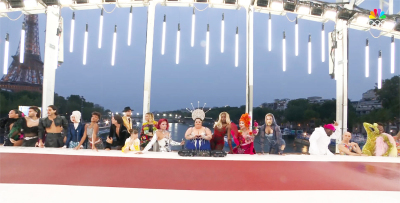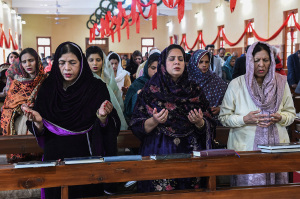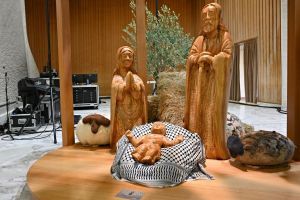Paris Olympics Last Supper blasphemy was repugnant to Jews as well

How could it not be? Its aim was to mock all religious beliefs, not just the Christian faith.
It used to be that opponents of religion depicted it as getting people to believe unreasonable things they never saw. The Paris opening flipped that. You heard the lame non-apologies. If you rejected them, as I did, it was because you trusted your eyes more than the unreasonable excuses you heard through MSM. What you saw was an attempt to take something Christians see as holy and ridicule it in the extreme. The target of that mockery was not limited to Christianity per se, but to all who manifest intense belief in a God who has normative demands on human beings. That includes Jews.
The French are justifiably proud of their role in making liberty part of everyman’s expectations, especially through the French Revolution, which inspired so many others. (Actually, ours in the USA came first.) They therefore eagerly push the boundaries of personal liberties — except in regard to religion, or in including groups not particularly in favor — like Christians.
There is much history to this. The French Revolution almost immediately devolved into anti-Christian practices. The revolutionary governments stripped the Church of its money, shuttered its churches, made clergy the vassals of the State, and proclaimed a secular religion in which the altar in Notre Dame was replaced with an icon of Reason — which became the new secular religion. Even the calendar was modified, replacing the seven-day week of the Bible with a more progressive 10-day unit.
Personal liberties did not fare any better. While the Declaration of the Rights of Man (1789) is truly one of Western civilization’s stellar achievements, those rights were whittled away after just a short passage of time. By 1794, the ruling National Convention had passed laws imposing the death penalty for "disparaging the National Convention," and "misleading public opinion." The rights of man had become the rights of those people that a ruling class found deserving of those rights. In the Reign of Terror, the guillotine gorged itself on human sacrifices to the new, progressive ideology.
Pushing a libertine agenda while showing hostility to traditional faith is therefore nothing new in Paris. Disparaging the Last Supper is just the latest installment.
For argument’s sake, though, let’s examine what the Olympic officials want us to believe (even if denied by the performers themselves). The second table scene had nothing to do with the Last Supper, they tell us. No, it was all about Dionysus — the god of festivity (and wine-making, fertility, freedom from restriction — and insanity!) You know. The naked guy in blue in the first table scene. Makes sense to revisit the ancient roots of the Olympic games, does it not?
In museums around the world, you will find many works of art depicting Dionysus. Previous Olympiads did so as well. Those displays acknowledged the past; the recent one celebrated and embraced it. (The blue, Dionysus guy on the platter also released NU, a song touting his novel idea for bringing about world peace: If everyone gets naked, there will no longer be any wars, because where could we keep our weapons?) In the past, we looked upon the Greek gods as a part of human civilization that we had mercifully outgrown. In the recent Olympic skit, we’ve moved to enthusiastically deifying the eradication of boundaries and limits.
So, from whatever angle you approach it, it is hardly surprising that the French opening of the Olympics would push the limits, and contain elements of hostility to religion, shock (like the headless Marie Antionette), sexuality, and abandoning traditional norms.
There is another tradition, one which clashed with Dionysus, and rejected the divinity of a group of overage minors who murdered, pillaged, and raped. In ancient Jerusalem, the ruling Syrian-Greeks had built a gymnasium where athletes — the forerunners of today’s Olympians — competed in the nude. They saw the human body as the most perfect example of the wisdom of their gods.
The next hill over housed the Temple, where the priests participated in a superbly synchronized service of the One God, a service very much bound by rules. The holiness of the Temple progressed, step-wise, from outside to the most internal areas. The holiest location was the Sanctum Sanctorum, completely cut off from view. It housed (in earlier days) the Ark of the Law, containing the tablets of the Ten Commandments. They, too, were kept hidden. The area was accessed only one day a year, on Yom Kippur, by the High Priest, as a representative of the entire nation — and his sight was obscured by a cloud of smoke.
In a word, while the Greeks celebrated external beauty, the Temple taught the notion that the most holy, the most important elements of human life were internal. Things like character and integrity. Connection with God. The more internal, the more profound. And the more hidden from the public gaze, which would make it common and cheap.
We call this the Judeo-Christian legacy. It values internal perfection, respects tradition, and lives by timeless norms that have always enriched mankind. It is the polar opposite of the spirit of the Olympics of 2024, and the real enemy of the libertine spirit that wishes to extinguish it.
Another skit approvingly pictured a threesome approaching a bedroom door, with shared amorous intent. It has been suggested that those in charge wanted to introduce as much French into the celebration as possible and figured that one of the few phrases that would be recognized outside of France was menage-a-trois. Contemplating this latest exercise in spitting upon traditional values, we’d suggest another phrase: Plus ça change, plus c’est la même chose. The more things change, the more they are the same.
Rabbi Yitzchok Adlerstein is the director of interfaith affairs for the Simon Wiesenthal Center, and an Orthodox rabbi.




























